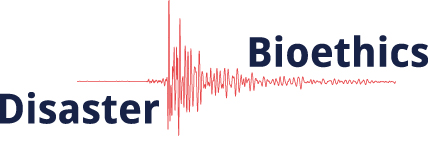Working Group 2: Bioethics, culture and moral theory
Working Group Chair: Bert Gordijn
Working Group Vice Chair: Caroline Clarinval
Full member list: Link (registered action members only)
Internal Documents: Link (registered action members only)
Information about Working Group 2 (copied from MoU)
Disasters often strike in one culture and lead to responses from other cultures. Ethical dilemmas arise when important values and beliefs are viewed and prioritised differently in different cultures. For example, fairness is an ethical principle valued across cultures, but viewed and implemented differently in different cultures. Gender issues will be examined in particular as these can generate challenging ethical issues. The Action’s network includes participants with experience in gender issues. As another example, burial practices are very important culturally, but may be resource intensive. Those from another culture may seek to expedite burials or use mass graves for pragmatic purposes. Cultural issues are involved here, but so too are ethics. The distress caused by preventing the usual burial and grieving process, or interfering with identification of the dead, can influence the recovery of a community (Morgan et al. PLoS Medicine 2006;3:e195). This research also found that the health risk from large numbers of dead bodies after a natural disaster is negligible, exemplifying how evidence is important in ethical decision-making.
 This WG will gather information on significant cultural challenges in disaster settings. The Action benefits from having participants who have wider networks in Europe, Asia, Africa and North America. Further connections will be established through the international organisations involved in the Action. From this review, the main ethical issues will be identified and analysed in STSMs. From these deliberations, proposals will be developed for ways of addressing cultural differences and the resulting ethical challenges.
This WG will gather information on significant cultural challenges in disaster settings. The Action benefits from having participants who have wider networks in Europe, Asia, Africa and North America. Further connections will be established through the international organisations involved in the Action. From this review, the main ethical issues will be identified and analysed in STSMs. From these deliberations, proposals will be developed for ways of addressing cultural differences and the resulting ethical challenges.
Another aim of WG2 is to address the role of ethical theory in disaster bioethics. Ethical decisions are strongly influenced by ethical theories, but each has strengths and limitations, especially when applied in disaster settings (Agency for Health Care Research and Quality 2006 http://www.ahrq.gov/research/mce/). In disaster planning, consequentialist approaches can conflict with duty-based approaches. Conflicts can occur within one approach, where duties to patients or society may conflict with duties to family or self. This WG will investigate broad ethical concepts and theories and their place in disaster bioethics. It will aim to make proposals on a theoretical framework in which cultural differences and community norms are addressed and respected while ways of resolving differences are pursued. An algorithm for disaster bioethics that is theoretically sound and practically useful will be developed within WG2.
Picture:
By Pushkarv [GFDL (http://www.gnu.org/copyleft/fdl.html) or CC-BY-SA-3.0 (http://creativecommons.org/licenses/by-sa/3.0)], via Wikimedia Commons
